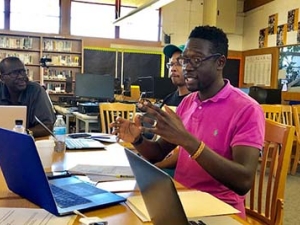

Research Bio
Travis J. Bristol is an associate professor of teacher education and education policy in Berkeley’s School of Education and (by courtesy) the Department of African American Studies. He is also the faculty director of the Center for Research on Expanding Educational Opportunity(link is external). Before joining Berkeley's faculty, he was a Peter Paul Assistant Professor at Boston University. Using qualitative methods, Dr. Bristol explores three related research strands: (1) the role of educational policies in shaping teacher workplace experiences and retention; (2) district and school-based professional learning communities; (3) the role of race and gender in educational settings. Dr. Bristol's research has appeared in over 70 peer-reviewed articles, book chapters, policy briefs, and opinion editorials including Urban Education, the American Educational Research Journal, Educational Evaluation and Policy Analysis, the Journal of Teacher Education, Teachers College Record, Harvard Educational Review, Brookings, and The Washington Post. He also co-edited two volumes: The Handbook of Research on Teachers of Color and Indigenous Teachers (with Conra Gist), which was published by the American Educational Research Association (AERA) and Men Educators of Color in U.S. Public Schools and Abroad (with Ashley Woodson), which was published by Routledge.
The National Academy of Education/Spencer Foundation, Ford Foundation, and AERA awarded Dr. Bristol dissertation fellowships (2013). He received the inaugural teacher diversity research award from the American Association of Colleges for Teacher Education (2016). Dr. Bristol was awarded a Ford Foundation Postdoctoral Fellowship and an emerging scholar award from the Comparative and International Education Society, African Diaspora SIG (2019). He received a National Academy of Education/Spencer Postdoctoral Fellowship (2020). Dr. Bristol received the Division-K Early Career Award from AERA (2021). He was awarded an Educational Researcher AERA Outstanding Reviewer Award (2022). Dr. Bristol received the AERA Early Career Award (2024). Most recently, he received the U.C. Berkeley Chancellor’s Award for Public Service - Faculty - Community Engaged Teaching Award (2025).
Dr. Bristol has received more than $7.4 million in research funding from a diverse group of funders, including the New York City Department of Education, the National Education Association, the National Academy of Education, the State of California, the W.T. Grant Foundation, the California Department of Justice, the William and Flora Hewlett Foundation, the Bezos Family Foundation, the Walton Family Foundation, the Charles and Lynn Schusterman Family Philanthropies, and the United Nations International Children’s Emergency Fund (UNICEF).
Dr. Bristol is on the editorial boards of Urban Education, the American Educational Research Journal, and the Association for Education Finance and Policy Live Handbook. He is also the chair of the National Board for Professional Teaching Standards Board of Directors, the first Black person to hold this position in the organization's 38 year history. Dr. Bristol also chairs the California Department of Education Teacher Diversity Advisory Group. Dr. Bristol is on the Board of Directors of the National Center for Teacher Residencies and the Albert Shanker Institute.
Dr. Bristol is a former student and teacher in New York City public schools and teacher educator with the Boston Teacher Residency program. Dr. Bristol earned his AB from Amherst College; an MA from Stanford University; and a PhD from Teachers College, Columbia University.
Research Expertise and Interest
race and gender, urban schooling, organizational contexts of teachers' work, educational equity, African American students in schools
In the News
Black Teachers Are Essential — and at Risk
Berkeley Talks: Berkeley Scholars Unpack What’s at Stake for U.S. Democracy
As K-12 students return, schools shouldn’t obsess over pandemic ‘learning loss’
America on edge: Berkeley scholars’ early election thoughts
Professor pushes for diversity in teacher workforce
Featured in the Media
Evidence suggests that Black, Asian and Latinx students in grades four through eight who have teachers that match their ethnoracial identity get fewer school suspensions, and researchers found students of all races have more favorable perceptions of their Black and Latino teachers. “Something is happening in the classrooms of these teachers, and this is something that's worthy of study and understanding,” said Britton, an assistant professor at UC Berkeley's Graduate School of Education.
Matching students’ race with those of their teachers can reduce rates of exclusionary discipline for Black and Latinx students in large, diverse and urban school districts, according to a new working paper. The study examined 10 years’ worth of data from New York City between 2007 and 2017.





